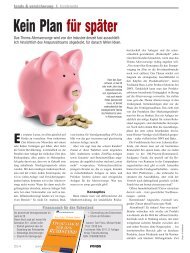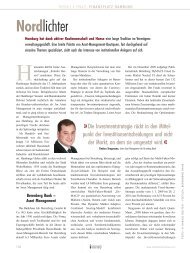Traditional German life funds are dominated by ... - Anke Dembowski
Traditional German life funds are dominated by ... - Anke Dembowski
Traditional German life funds are dominated by ... - Anke Dembowski
Create successful ePaper yourself
Turn your PDF publications into a flip-book with our unique Google optimized e-Paper software.
“Old age products must be solid, and so we <strong>are</strong><br />
expecting <strong>German</strong> clients will turn back to classical <strong>life</strong><br />
insurance products and private pensions”<br />
Rolf Florian, Debeka<br />
We hold securities of Hypo Real Estate and<br />
Lehman Brothers, but this is only a very small<br />
proportion of our portfolio,” he says. “We <strong>are</strong><br />
happy that we never offered unit-linked products,<br />
which <strong>are</strong> now seeing considerable losses<br />
on the side of the policyholders. Old age<br />
products must be solid, and so we <strong>are</strong> expecting<br />
<strong>German</strong> clients will turn back to classical<br />
<strong>life</strong> insurance products and private pensions.<br />
These products might have appe<strong>are</strong>d boring<br />
in the past, but it is time for a conservative<br />
products revival.”<br />
A general problem facing every investor is that<br />
diversification only works in normal market<br />
conditions, where stable correlations exist.<br />
During a crisis, correlations tend to increase:<br />
“We have simultaneous problems in the equity,<br />
bond and liquidity markets, so diversification is<br />
not much of a defence,” says Siegmund. “As<br />
insurance companies cannot go to the central<br />
banks, our only truly safe haven at the moment<br />
is government bonds. This crisis is quite severe<br />
– it is touching every region and almost all<br />
financial instruments. Therefore, we will be<br />
very c<strong>are</strong>ful in our strategic asset allocation<br />
decisions for next year,” he adds.<br />
Most experts believe <strong>German</strong> <strong>life</strong> insurance<br />
companies will be able to produce the guaranteed<br />
minimum performance during the crisis,<br />
and that the promised surplus performance<br />
(“Ueberschussbeteiligung”) – the performance<br />
above the guaranteed minimum level<br />
– might be slightly reduced for the year 2009.<br />
As long as there <strong>are</strong> still reserves left, the industry<br />
will try to keep the surplus performance as<br />
stable as possible.<br />
No increased surrender activity<br />
<strong>German</strong> insurance companies do not face<br />
liquidity or refinance problems in the current<br />
financial crisis, as they can rely on their regular<br />
premium and interest income. “We do not see<br />
an increased level of surrender,” says Siegmund.<br />
“However, we have a lot of policies at R+V<br />
reaching maturity now, as we have been writing<br />
many new policies in the 1980s and 1990s.<br />
But this is planned and, therefore, not a problem.<br />
We also do not anticipate surrenders in<br />
our unit-linked policies; it is only the new business<br />
that is likely to contract. Currently, savers<br />
do not like to invest in long-term products.”<br />
The surrender rate of <strong>German</strong> <strong>life</strong> policies<br />
remains stable at about 5% of the contracts – in<br />
2007 it was at 4.95% and in 2006 at 5.05%.<br />
(This figure includes contracts that were<br />
bought back, as well as contracts where only<br />
premium payments were stopped.) Although<br />
the industry association collects this data just<br />
once a year, there <strong>are</strong> no indicators of increased<br />
surrender activity during the current crisis.<br />
MaRisk and QIS4 as preparation for<br />
Solvency II<br />
While many <strong>German</strong> insurers espouse investment<br />
conservatism as a form of risk<br />
management, national supervisor BaFin also<br />
watches organisational risks. Recent changes<br />
in paragraph 64a of the insurance supervisory<br />
act (Versicherungsaufsichtsgesetz,<br />
VAG), require <strong>German</strong> insurance companies<br />
to apply qualitative rules about internal control<br />
and reporting systems. Under the<br />
so-called “MaRisk” rules, insurance supervisor<br />
BaFin has implemented stress tests that<br />
<strong>are</strong> applied to the asset side of insurer balance<br />
sheets. While most of the larger insurance<br />
companies in <strong>German</strong>y insist they already<br />
have sufficient internal control and steering<br />
systems in place, some of the smaller companies<br />
will have to implement more systems to<br />
comply with MaRisk.<br />
The QIS4 tests, as opposed to MaRisk, <strong>are</strong><br />
quantitative impact studies in preparation for<br />
Solvency II, first pillar. These tests will calculate<br />
the combined effect of stresses on assets<br />
and liabilities on the solvency and the capital










